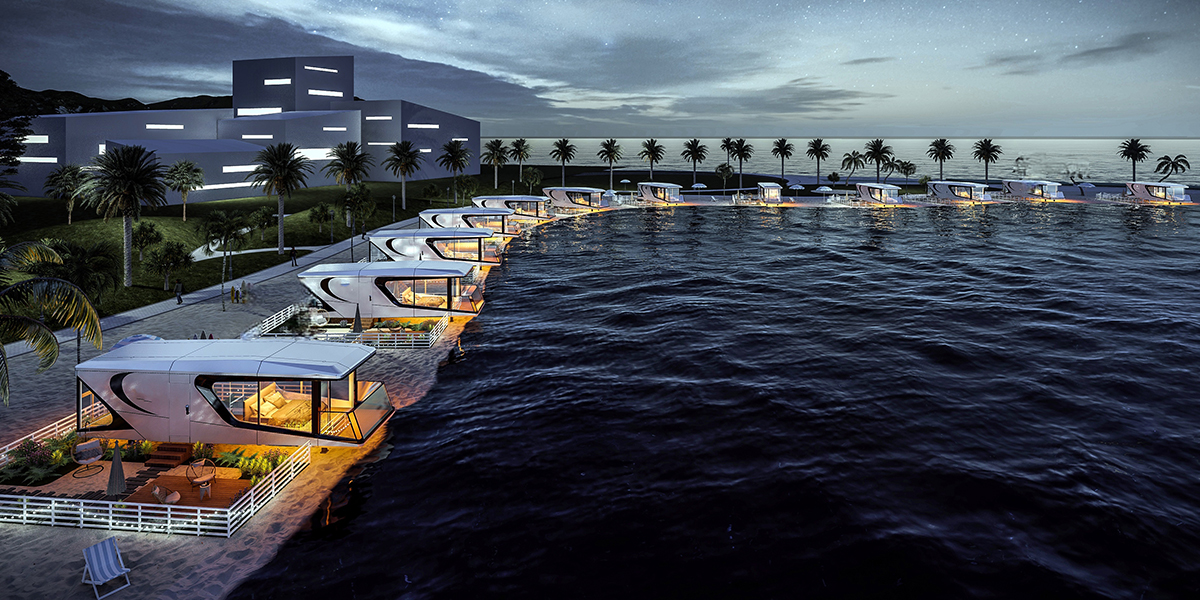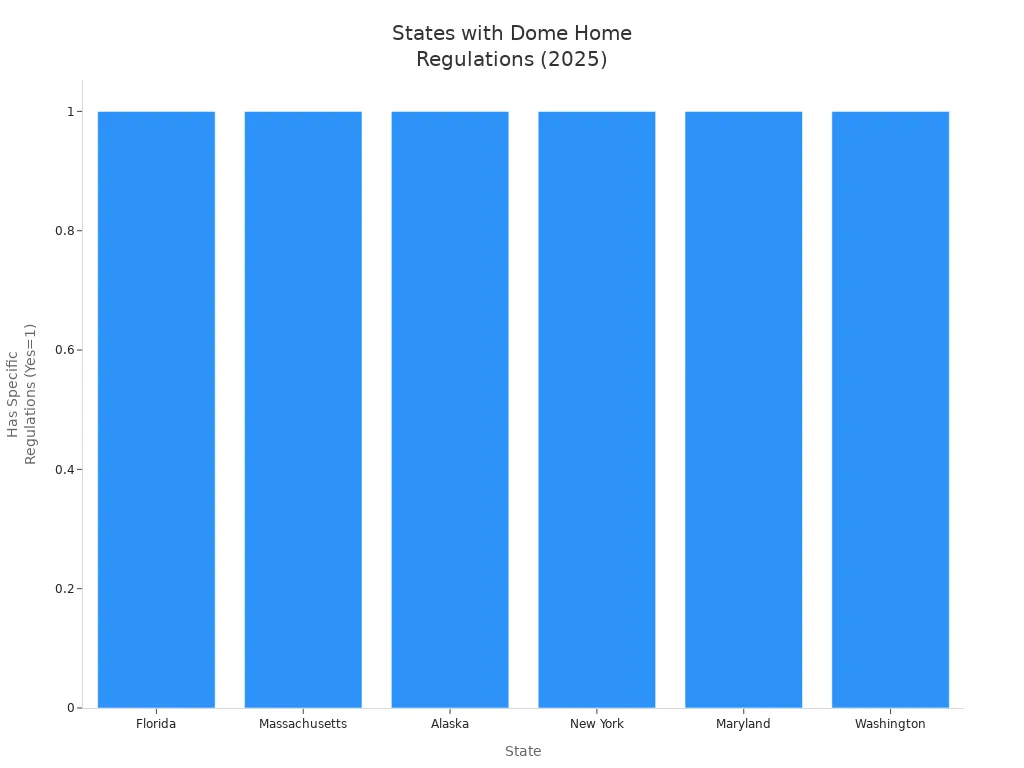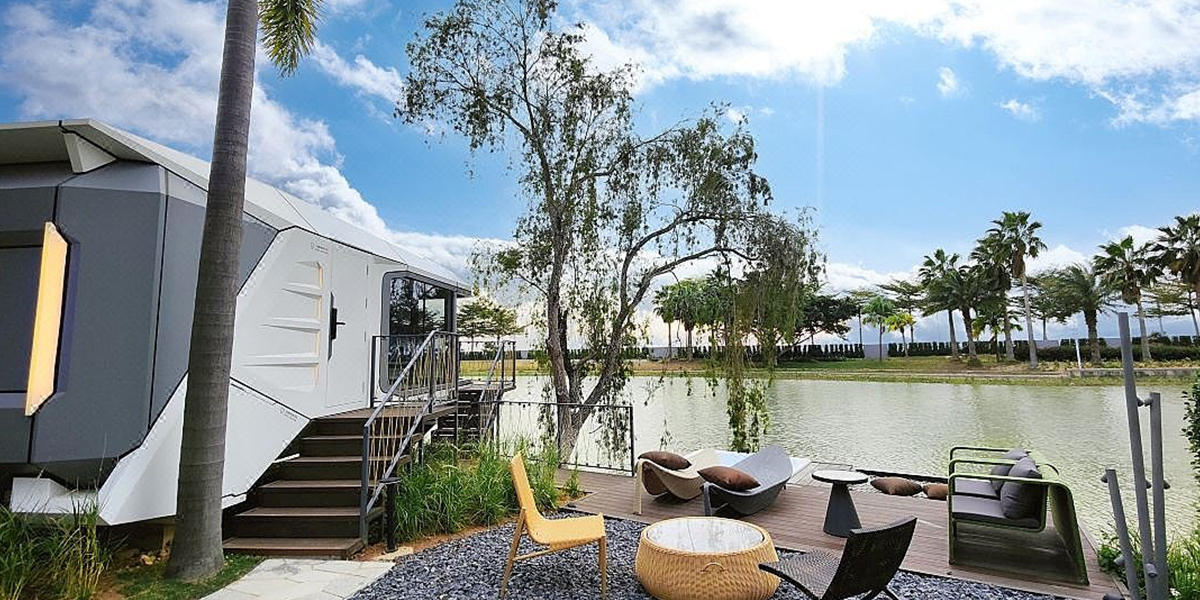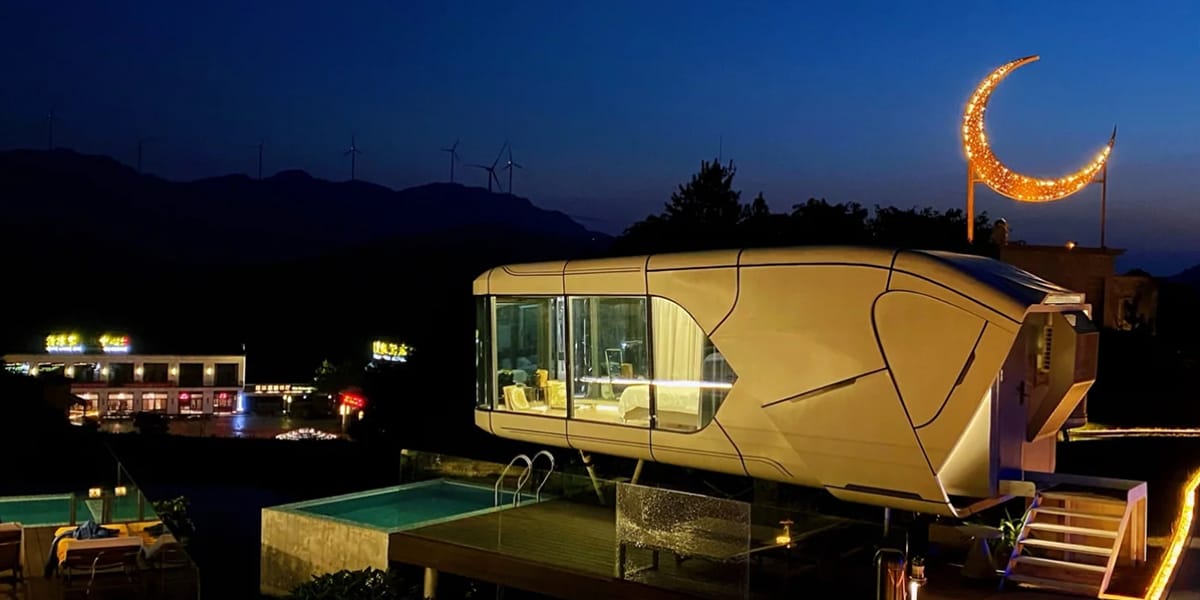
16 Aug Are Capsule Houses Legal in the USA in 2025
Table of Contents
Capsule houses in the USA have tricky legal rules in 2025. If they are allowed depends on local zoning laws and building codes. It also depends on what permits are needed. Some states made special rules for capsule homes. This is common where dome home rules are used. For example, Florida, Massachusetts, Alaska, New York, Maryland, and Washington all have strict building codes. They also have special permit rules for capsule houses usa. The table below shows how each state is different:
State | Specific Regulations on Dome Homes (2025) | Key Regulatory Aspects |
|---|---|---|
Florida | Yes | Strong building codes for hurricanes; permits need detailed plans; zoning is different in each place; off-grid is okay in some remote areas |
Massachusetts | Yes | Strong building codes; permits need engineering papers; zoning does not allow off-grid systems; Appendix Q IRC is used |
Alaska | Yes | Building codes for cold and earthquakes; permits are needed; off-grid is legal; zoning may not allow tiny homes |
New York | Yes | Very strict building codes and zoning; homes must be a certain size; off-grid is possible but has rules |
Maryland | Yes | Dome homes are allowed by local codes; permits need detailed plans; off-grid is not allowed in most places |
Washington | Yes | Dome homes are allowed; permits are needed; local design and utility rules; off-grid is allowed but has some rules |

Buyers must check local rules before getting a capsule house. Legal rules can change by city or county. Capsule houses usa may look cool, but knowing the law keeps you safe. It also helps you follow the rules. Capsule houses and capsule homes give special ways to live when owners follow the law.
Key Takeaways
Capsule houses must follow federal and local laws. Local zoning and building codes are very important for approval. Rules for capsule houses are different in each state, city, and county. You must check local rules before you build. Getting the right permits early is important. Working with professionals helps you avoid delays. This also makes sure your capsule house is safe and legal. Capsule houses can be for living, renting, or short stays. Each use needs different permits and zoning rules. Some states have new laws that make building small homes easier. This shows more people accept capsule houses as homes now.
Capsule Houses USA: Legal Overview
Federal vs. Local Authority
Capsule houses usa have to follow many different rules. Both federal and local governments make these rules. The federal government gives basic guidelines for capsule homes. But local governments have more control over building and zoning laws. This means rules are different in each place.
Federal laws set some important standards for capsule houses. These rules help keep people safe, healthy, and private. Local governments add more rules, which can make things harder.
Note: Local city or county offices usually decide if you can build or use a capsule house in your area.
The table below shows some main federal laws and rules for capsule houses usa:
Federal Law/Guideline | Key Requirements/Impact on Capsule Houses |
|---|---|
International Building Code (IBC) | Sets minimum room size and ceiling height; capsule houses are often too small and need special permits. |
National Fire Protection Association (NFPA) Standards | Needs flame-resistant materials, smoke detectors in each sleeping area, and clear escape routes. |
US Department of Health | Requires at least one shower and two bathrooms for every 10 guests, which is hard for shared bathrooms in capsule houses. |
Zoning and Short-term Leasing Laws | Stops commercial rentals in some areas; capsule houses must be in certain zones and need special licenses for short stays. |
Privacy Laws | Controls how cameras and guest data are used, so owners must be open and protect information. |
Federal laws are just the starting point for capsule house rules. Local codes and permits are often what really matter. Even if a capsule house meets federal rules, it can still be rejected if local zoning does not allow it.
Recent Legal Trends
Lately, lawmakers have changed rules to help with housing problems. Some states, like Montana and Washington, made new laws for micro-housing and capsule homes. These changes include fewer parking spaces for small units, no height limits, and taller buildings with fewer stairs. Washington got rid of parking rules for apartments up to 1,200 square feet and now allows bigger buildings near buses and trains. Other states made building codes easier, lowered local fees, and let people build more accessory homes.
Montana made rules for less parking and no height limits for small homes.
Washington took away parking rules for apartments up to 1,200 square feet.
Many states now allow more accessory homes and lower local fees.
States in the West and Northeast are faster to allow micro-housing, but the South and Mountain West are slower because of local customs and zoning.
Cities like Seattle, San Francisco, and Boston started new programs and changed zoning to help capsule houses usa. Seattle now lets micro-units be built in all big apartment areas, and most new rentals are micro-units. Boston started small-living programs after people liked the idea, and now many new rentals are micro-units. These changes show that more people accept capsule houses and capsule homes as good ways to live in cities.
Capsule house laws keep changing. Lawmakers and city planners know people need more ways to live. They update rules to fit new living styles. But if you want a capsule house usa, you still need to check both federal and local rules.
Regulations for Capsule Houses
 Zoning Laws
Zoning Laws
Zoning laws are very important for capsule houses. These rules say where you can put a capsule house. Many places only let capsule houses in the country or suburbs. In busy cities, these homes are often not allowed. Some rules say homes must be at least 500 square feet. This stops smaller capsule houses from being built. Setback rules keep homes away from property lines. Design rules can make capsule houses look like other homes nearby. Some rules protect nature and stop building near wetlands or steep hills.
Zoning laws usually let capsule houses in certain places.
Minimum size and setback rules decide where you can build.
Design and nature rules keep neighborhoods and land safe.
Building Codes
Building codes make sure capsule houses are safe to live in. The International Residential Code is the main rule for these homes. Appendix AQ gives extra help for tiny houses. Local codes can add more rules. Capsule houses must be strong and safe. They need to stand up to wind and earthquakes. They must also stop fires, block noise, and keep heat in. Building codes say you need good plumbing, safe wires, and easy ways to get around. Most builders follow both local and national rules to stay legal.
Permitting Process
The permitting process checks if capsule houses follow all the rules. Owners must get permits before they build. The steps are:
Make plans that show the house follows all codes.
Fill out forms for building and other needed permits.
Put in safety things like smoke alarms.
Have inspections for the house, utilities, and safety.
Documentation/Permit Type | Description/Requirement |
|---|---|
Building Permit Application | Plans, materials, and how much area the house covers. |
Zoning Compliance Documentation | Site plans that show the house follows zoning rules. |
Environmental Permits | Needed if the house could hurt nature areas. |
Utility Connection Plans | Plans for safe water, power, and sewer hookups. |
Inspections Documentation | Proof of all needed inspections. |
Permits make sure capsule houses follow all rules and are safe. Talking to local officials early helps you avoid problems and delays.
Regional Differences in Capsule Houses USA
State Variations
Capsule houses have different rules in every state. Some states, like Texas and California, make it easier to build small homes. Other states, such as New York and Massachusetts, have strict rules. These rules limit where capsule houses can go. In Florida, the building code says how big tiny homes can be. It also says you need permits and inspections. States use their own property rules to decide if capsule houses are allowed. Because of these differences, a capsule house that is legal in one state may not be legal in another.
City and County Rules
Cities and counties add more rules for capsule houses. Local governments make their own zoning rules. For example, Spur, Texas, lets tiny homes if they connect to city utilities and do not have wheels. Fresno, California, allows tiny homes in backyards if they follow lot size and safety rules. Walsenburg, Colorado, lets smaller homes with special permits. Gold Beach, Oregon, allows tiny homes on the same lot as a main house if they connect to the city sewer. The table below shows how city and county rules are different:
Location | Key Rules and Requirements |
|---|---|
Spur, Texas | Must be on foundation, connect to utilities, no wheels, max size < 900 sq ft, permits needed |
Fresno, California | Allowed as accessory units, lot size limits, must be immobile, safety standards apply |
Walsenburg, Colorado | Variances for homes < 500 sq ft, must be permanent in residential zones |
Gold Beach, Oregon | Size 200-600 sq ft, must connect to sewer, allowed on same lot as main house |
In New Jersey, zoning rules change from town to town. Montclair and Maplewood say homes must have permanent foundations and be a certain size. Princeton and East Orange use their own zoning and safety rules. Bradley Beach has size and setback rules and only lets tiny homes in some areas. Each city or county has its own way of making rules, so owners need to check local laws before building.
Temporary vs. Permanent Use
Capsule houses can be used for a short time or forever. Local zoning laws treat these uses in different ways. Temporary capsule houses need special permits and must follow strict rules. They can only stay for a set time, usually up to two years. Owners must show site plans, use ground anchors, and keep the area clean. Permanent capsule houses go through the normal permit process. They can stay on the property with no time limit and must follow all zoning and building codes. The table below shows the differences:
Aspect | Temporary Structures | Permanent Structures |
|---|---|---|
Permit Required | Temporary structure permit needed | Standard building permit needed |
Duration | Limited to construction period (max 2 years) | No time limit |
Anchoring | Ground anchors every 10 feet | Anchoring per permanent building codes |
Skirting | Required around perimeter | Not usually required |
Removal | Must remove after permit expires | No removal required |
Tip: Always check local zoning rules before picking a temporary or permanent capsule house. Local officials can help you understand which rules you need to follow.
How to Comply with Capsule House Regulations
 Research Local Laws
Research Local Laws
If you want to build a capsule house, you need to know the local rules. Every city and county has its own laws. You must do research before you start. Here are some steps to help you begin:
Look at local and state building codes. Check the International Residential Code and any rules for your state.
Call your local building office. Ask about inspections, zoning, and permits for capsule houses.
Talk to state groups like the Department of Housing or Contractors Board. They may have extra rules.
Find out if there are any environmental or energy rules you must follow.
If you are bringing a capsule house from another country, ask U.S. Customs and Border Protection about import rules and paperwork.
Tip: Doing research early can help you avoid mistakes and delays when getting permits.
Steps for Permitting
Getting a permit takes careful planning. If you skip a step, you may have problems. The table below shows common mistakes and how to avoid them:
Common Mistakes to Avoid | Explanation |
|---|---|
Not getting the right permits early | You may face delays and extra costs if you build without permits. |
Not knowing how the law classifies your house | Capsule houses can be classified in different ways, which changes what permits you need. |
Ignoring zoning and land rules | If you do not follow zoning rules or go to hearings, your project may stop. |
Not following design and fire safety codes | If you do not meet safety rules, you may not get a permit. |
Skipping inspections or not preparing the site | This can cause trouble when you try to get final approval. |
Not talking to local officials early | You may not know all the permit rules and could break the law. |
Note: Always keep good records of your permits and inspection papers.
Working with Professionals
Licensed contractors help you understand local rules and permits. They guide you from planning to the last inspection. Qualified installers do important jobs like hooking up water, power, and sewer. This makes sure your capsule house is safe. Architects and builders who know capsule house rules can help with design and permits. Their skills help your project stay on track and follow the law.
Legal experts can also help. They know about zoning and permit problems. They make the building process easier. Getting help from professionals lowers the chance of mistakes and helps you avoid problems.
Space Capsule Home Use Cases
 Residential Living
Residential Living
A space capsule home is a new way to live. Many people pick a space capsule house because it saves space. These homes use smart tech and green materials. They are good for small families or people who like simple, eco-friendly living. A space capsule home is wider and taller than most tiny homes. This gives people more room to stand and move. Builders use strong metals like aviation-grade aluminum and galvanized steel. These help the space capsule house stay safe in bad weather, like hurricanes or earthquakes.
People living in these homes get good insulation and energy-saving systems. This means they pay less for heating and cooling. The space capsule home is both useful and not too expensive. Owners can add more rooms or move their space capsule house if needed. Some people use a space capsule home for short trips, like at festivals. Others live in a space capsule house all the time and like how strong and flexible it is.
Local rules decide where you can put a space capsule home. Some cities have tough rules about house size and land use. This can make it hard to use capsule houses in some places. Builders sometimes have problems with old rules, which can slow things down and cost more. Even with these problems, many people still want a space capsule home for a modern, green life.
Commercial and Rental Uses
A space capsule house can be used for business too. In cities, capsule houses are often used as capsule hotels. These give cheap, small rooms for travelers, students, and young workers. Resorts and pretty places use a space capsule home for green places to stay in far-away spots. Hotels like that a space capsule house is quick to set up and stands up to bad weather. This is great for short-term or seasonal use.
Capsule houses also help after disasters. Groups use a space capsule home to give safe, comfy shelter fast. These homes have bathrooms and kitchens, so they work well for quick help. Businesses use a space capsule house as a pop-up store, office, or studio. They like that it is easy to move and uses space well.
Owners must follow local rules when renting or using a space capsule home for business. Some places only let you rent for a certain number of days each year. Owners need to keep records and tell local leaders about their rentals. These steps make sure the space capsule house is legal for business use.
Capsule houses have different rules in each city. Here are some important things to know:
Not all places let you have capsule houses. Zoning laws can say where you can put them.
You need a permit for every home. Building codes might not work for every design.
Some cities say yes to capsule houses, but others say no.
It can take a long time to get approval, especially if officials do not know about capsule houses.
If you want a capsule home, talk to local officials and experts first. For more help, the article “How Big Can a Tiny House Be? Everything You Should Know” from Capsule Castle explains home size rules and how to follow them.
FAQ
Are capsule houses legal everywhere in the USA?
Capsule houses are not allowed in every place. Local zoning laws and building codes decide if you can build or use one. You should always ask your city or county office before you start.
What permits do owners need for a capsule house?
Most owners need a building permit, zoning approval, and permits for water and power. Some places also want environmental permits. Each city or county has its own rules.
Can someone use a capsule house as a rental property?
Many cities let people rent out capsule houses, but rules are different. Some places limit short-term rentals or need special licenses. Owners should check local rental laws before renting out a capsule house.
Do capsule houses meet safety standards?
Capsule houses must follow local building codes and safety rules. These rules cover fire safety, strong walls, and safe exits. Inspections make sure each home is safe to live in.
How long does it take to get approval for a capsule house?
How long it takes depends on where you live and the permit steps. Some cities say yes in a few weeks. Others take months. Doing research early and filling out all forms helps things go faster.




 Zoning Laws
Zoning Laws Research Local Laws
Research Local Laws Residential Living
Residential Living